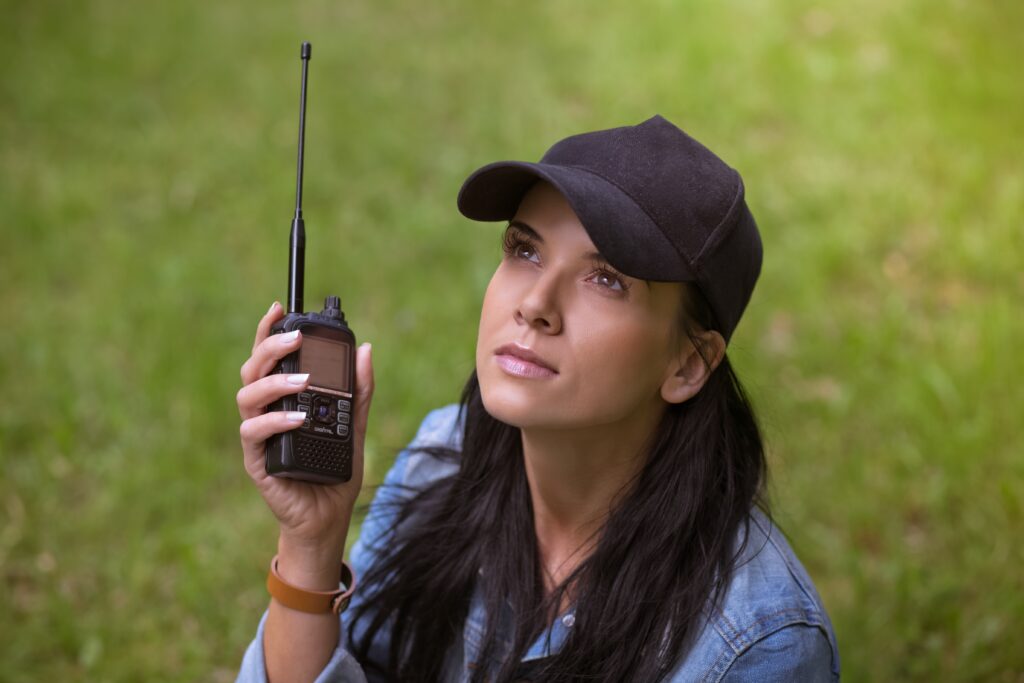By Andy Valencia
We keep bottled water in case our faucet’s suddenly dry. We have emergency rations in case the store’s supply chain is interrupted. And then there’s how we keep in touch, find out things, and buy things. Everything – phones, texting, email, apps – has converged on internet technology. When that “cyber event” happens, you should expect all of them to go out. Is there a “Plan B”?
Welcome to the world of amateur radio – “ham radio,” with operators known as “hams.” This radio service has a bunch of frequencies reserved to it; its operators can handle voice and data, and all of it keeps working no matter what happens to the internet. Like cell phones, it works over the air. Unlike cell, it doesn’t depend on a corporation.
The smallest and cheapest way to operate on ham radio frequencies is with a hand-held unit – a “handie-talkie” – which is about the size of a cell phone. Hams can talk directly to each other at ranges up to a couple of miles. But they can also install a radio about the size of a paperback book in their car, mount an antenna on the roof, and then talk across an entire city.
Hams also have the equivalent of a cell tower, known as a “repeater.” Hams put a repeater device, along with its big antenna, on top of some suitably large building. Via the repeater, both hand-held and car-mounted radios are picked up by the repeater and retransmitted via that big antenna. The effect is that every ham on their handie-talkie or car-based radio can reach as far and wide as that repeater with its big antenna.
These repeaters aren’t very expensive, nor difficult to install. Vashon itself has a repeater on Maury, another at Sunrise Ridge, and one more right near town. Island-wide communication is trivial, even for that hand-sized handie-talkie. During a major cell network outage, our fire department has a ham station in their Emergency Operations Center. It will activate and be staffed 24/7, letting hams carry word of critical situations directly into VIFR from anywhere on the Island.
Thanks to ham radio, we don’t lose the ability to connect emergency services with islanders.
Some of the busiest hams have even put repeaters up on our local mountains, such as Tiger Mountain, Lyman Hill, and Capitol Peak. If communications are disrupted regionally, how does the Red Cross hear about what is needed in, say, Tacoma? A ham in Seattle can easily talk to one in Tacoma by way of one of these repeaters, relaying public safety messages. ARES is the Amateur Radio Emergency Service, a group of hams dedicated to providing exactly this sort of help during emergencies.
What if the disruption is national?
Hams are also licensed to communicate on shortwave frequencies. These are lower frequencies, and thus require larger antennas, starting at something about the size of the flagpole at our post office – but they can be much larger. In exchange for the bigger equipment and antennas, hams are able to choose the right time and frequency, and communicate across the state, to neighboring states, across the nation, and even internationally. You won’t watch Netflix over shortwave radio, but during an international disruption, it can handle “health and welfare” messages, which will let you check on loved ones who are thousands of miles away.
City, state, national, and international communications will remain possible during a cyber event. Many hams also keep batteries and generators so their equipment can stay on the air during power interruptions, and repeaters are also almost always installed with backup power. A world that is ever more complicated and interconnected is inherently ever more fragile. Ham radio will keep working even when everything else lies in ruin.
Ham radio is mostly just a fun hobby, and yet it lets you develop skills that can suddenly be lifesavers for yourself or your community. It is a licensed service, which means you have to pass a federal test and get a license before you go on the air. The training is available for free online, and the tests are easy, and either cheap or free to take. Your local ham club will have people who are authorized to administer such tests. On Vashon, the club’s web site is w7vmi.org
We hope to run into you on the air! 73’s de Andy Valencia K6AJV. What’s a “73 de”? The web version of this article has a pointer to a “hamspeak” resource.

